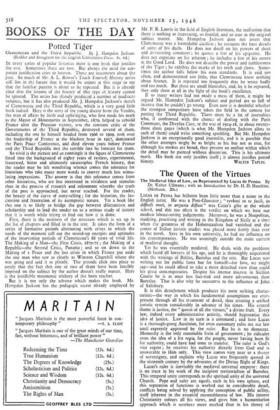BOOKS OF THE DAY
Potted Tiger
Clemenceau and the Third Republic. By J. Hampden Jackson. (Hodder and Stoughton for the English Universities Press. 4s. 6d.)
IN every series of popular histories there is one book that justifies the rest. Sometimes there are two. But always the need for cor- porate justification cries to heaven. These are statements about the past. So much of Mr. A. L. Rowse's Teach Yourself History series still lies in the future that it would be unjust at this stage to say that the familiar pattern is about to be repeated. But it is already clear that the lessons of the history of this type of history cannot be ignored. The series has already produced a number of mediocre volumes, but it has also produced Mr. J. Hampden Jackson's sketch of Clemenceau and the Third Republic, which is a very good little book indeed. Here is the story of the young doctor from the Vendee, the man of affairs by birth and upbringing, who first made his mark as the Mayor of Montmartre in September, 1870, helped to rebuild France after the Prussian victory, was the constant critic of the Governments of the Third Republic, destroyed several of them, including the one he himself headed from 1906 to 1909, took over the leadership of France at the blackest hour in 1917, dominated the Paris Peace Conference, and died eleven years before France and the Third Republic met the terrible fate he forecast for them.
So vivid is the picture and so cunningly is the figure of Clemenceau fitted into the background of eighty years of restless, experimental, frustrated, bitter and ultimately catastrophic French history, that the reader may be left wondering whence comes the tolerance for historians who take many more words to convey much less stimu- lating impressions. The answer is that this tolerance comes from other historians, who are less interested in vividness and stimulus than in the process of research and refinement whereby the truth of the past is approached, but never reached. For the reader, the beauty of the curve of story-telling ; for the historian, the fas- cination and frustration of its asymptotic nature. Yet a book like this one is so likely to bridge the gap between dilettantism and scholarship and to lead the reader on to a serious study of history that it is worth while trying to find out how it is done.
First, there is the neatness of the structure which is set up in the list of chapters and filled in in the text. It takes the form of a series of formative periods alternating with crises in which the needs of the moment call out the stored-up energies and aptitudes of the intervening periods of Clernenceau's 88 years of vivid life. The Making of a Man—the First Crisis, 187o-71 ; the Making of a Republic—the Second Crisis, Panama ; and so on down to the Making of a Peace and the last crisis in which France put aside the one man who saw as clearly as Winston Churchill where she was going and said it as plainly. The periods click into place so neatly that the fact that one or two of them have been forcibly imposed on the subject by the author doesn't really matter. Here is the justifiable mnemonic trickery of the born teacher.
But it is not only the scheme, which makes the book. Mr. Hampden Jackson has the pedagogic secret already employed by
Mr. F. R. Leavis in the field of English literature, the realisation that there is nothing so interesting, so fruitful, and so true as the original subject matter. Mr. Hampden Jackson does not assert that Clemenceau was a formidable cruellest ; he recounts the bare details of some of his duels. He does not dwell on his powers of short and devastating comment ; he quotes a few of his epigrams. He does not expatiate on his atheism ; he includes a few of his sneers at the Good Lord. He does not describe the power and ruthlessness of the Tiger ; he exhibits the marks of his teeth and claws. Some- times the author falls below his own standards. It is said too often, and demonstrated too little, that Clemenceau knew nothing about finance. It is repeated too frequently that he wrote badly and too much. But these are small blemishes, and, let it be repeated, they only show at all in the light of the book's excellence. If so many writers had not made a mess of them, it might be argued Mr. Hampden Jackson's subject and period are so full of interest that he couldn't go wrong. Even now it is doubtful whether the strongest competitors have taken the field in the contest for potting the Third Republic. There must be a lot of journalists who, if confronted with the chance of dealing with the Paris Commune, the Dreyfus Case, or the war of 1914-18, in about twenty- three short pages (which is what Mr. Hampden Jackson allots to each of them) could write something sparkling. But Mr. Hampden Jackson is an exceptionally good journalist, and it is possible that the other attempts might be as bright as his but not as true, for although his strokes are broad, they present an outline within which the detail may be painted without distortion. This is his ultimate merit. His book not only justifies itself ; it almost justifies potted


































 Previous page
Previous page